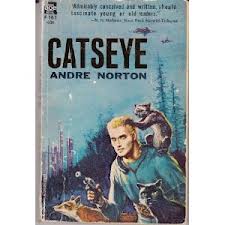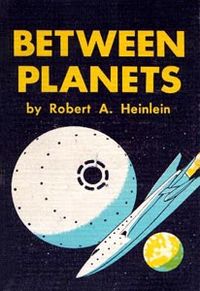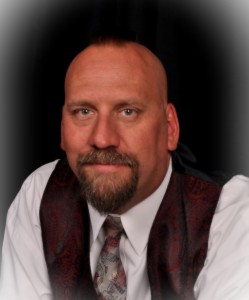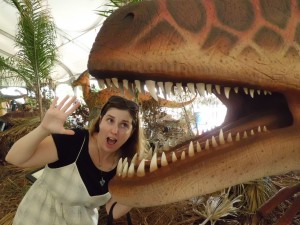I’ve said in previous Fictorian blogs that I’ve been both an omnivorous and a ravenous reader since as far back as I can remember. Oddly enough, though, as I’ve also previously mentioned, I was never someone who knew at an early age that I was going to be a writer. I’m not sure why, other than I remember being tremendously in awe of anyone who could write a whole book, and never dreamed that I could do that.
I did, however, begin wishing that I could write a book. And I can tell you exactly when it happened. In early 1963 I was in 6th grade in a school on Ben Eielson Air Force Base, just south of Fairbanks, Alaska.
The Scholastic Book Program was in full swing by then, and every month or so a brochure would come out listing books we could order. I think it was in January that one listing in the brochure caught my eye. It had an intriguing descriptive blurb, an intriguing title-Catseye-and a cool cover.
It was by Andre Norton, whom I’d never heard of before, but that was okay-I hadn’t heard of a lot of authors. I checked the space for it on the order form, and waited.
The day that it arrived, I brought the book home, plopped myself on my bed, opened the cover, and found myself lost in a strange and amazing new universe.
I had just encountered my first real science fiction. Eleanor Cameron’s The Wonderful Flight to the Mushroom Planet and Edward Eager’s Half Magic, charming though they were, lost me to a universe of interstellar civilizations, space travel, warfare, telepathy, sapient animals, and aliens. To this day, if I’m asked the “you’re alone on a desert island and you can only have the books of one author” question, Norton would be a finalist in my short list.
Andre Norton was actually Alice Mary Norton. She began writing at a time when it was very difficult for women authors to be taken seriously, and she used the standard tactic of the time to overcome that problem-she adopted a pseudonym. She actually used at least three over her career, but almost all of her output was published under Andre Norton. Bibliography She did eventually legally change her name to Andre Alice Norton.
Norton was a superlative story teller, and had a gift for creating characters that even today I connect with. Whether it was space opera, or earthbound adventure, or historical fiction, or fantasy, a book by her sucked me in. I would read by flashlight at night in order to finish a book after bedtime. And it was her work, first and foremost, that lit in me not the desire to write, but the wish that I could write like that.
Of course, once I found real science fiction, I started hunting for as much of it as I could find. The libraries on the base had some, and I found Isaac Asimov, Arthur C. Clarke, Lester del Rey, and a lot more. But the only other author who grabbed me like Norton did at that age-the only other author who resonated with me like Norton-was Robert A. Heinlein.
Both writers plotted gripping stories. Both could write very taut fiction that moved at a fast pace, yet had depth and characterization.
Both writers excelled at writing “coming of age” stories, which even today is probably the single most popular plot form in the young adult market.
It would be hard to find two better exemplars of novel writing for either adult or young adult markets.
But at that age, that wasn’t part of my thinking. I learned from them by osmosis, as I dove into their books again and again and again, reading and re-reading ad infinitum but never ad nauseam. And both of them, more than any other writers at the time, fueled that wish that I could be a writer.
To pick a work from each that connected with me very strongly, take Catseye from Norton and Between Planets by Heinlein.
Both are coming of age stories. Both are not routine run-of-the-mill plots. And both are not “talk-down-to-the-kids” stories. Both include violence and death. Toward the end of his book, Heinlein’s protagonist is asked to man a “dead-man switch”-to commit suicide, in other words-to ensure that a space vessel is destroyed rather than captured if a battle doesn’t go their way. In Norton’s book, her protagonist is offered the return of a family treasure and heritage for which he has longed all his life, but only at a monumental and deadly price.
I can’t describe to you the impact those two novels had on me. I literally cannot communicate the feelings I had when I finished each one of them, the least of which was, “Oh, wow.”
But with each reading and re-reading of books by these two masters of their craft, that wish that I could write grew, until finally, sixteen years after I opened the cover to Catseye the first time, it became a desire to write, and I first set pen to paper-literally. It has been a long road since then to where I am as a writer today, and it’s one I don’t think I would have walked without the influence of Andre Norton and Robert A. Heinlein.
Thank you both.





